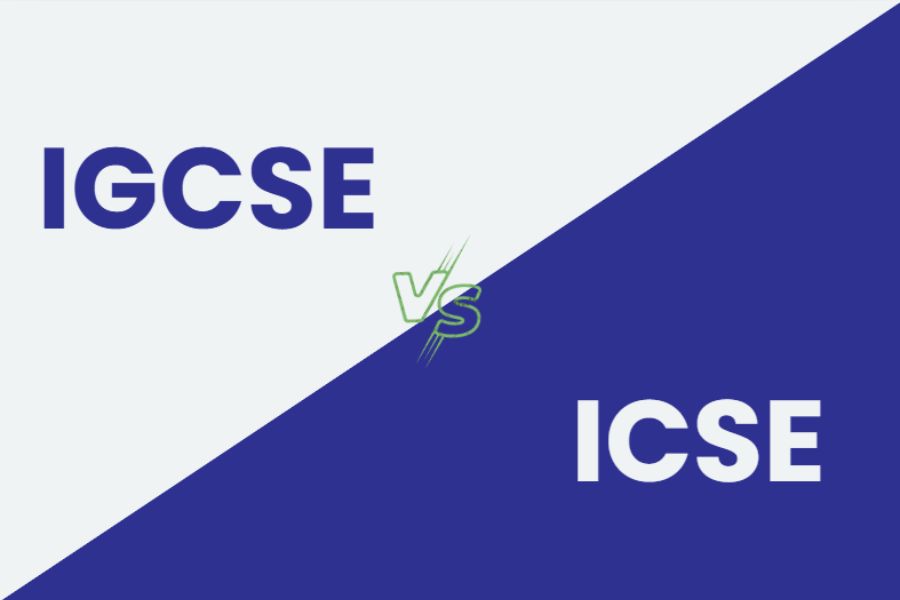What are the Differences Between IGCSE and ICSE?
Choosing between IGCSE and ICSE can be a significant decision for both students and parents. While both curricula have their merits, they differ in structure, focus, and global recognition. In this article, we will provide a detailed comparison, explain the differences between IGCSE vs ICSE, and help you determine which curriculum might be better suited for your needs.
What is IGCSE?
The International General Certificate of Secondary Education (IGCSE) is an internationally recognized curriculum offered by the Cambridge Assessment International Education (CAIE) board. It is widely accepted across the globe and is designed for students in grades 9 and 10. IGCSE encourages critical thinking, problem-solving, and a global outlook, making it ideal for students who aim to pursue higher education or careers abroad.
What is ICSE?
The Indian Certificate of Secondary Education (ICSE) is a national-level curriculum conducted by the Council for the Indian School Certificate Examinations (CISCE). It is also designed for students in grades 9 and 10 and focuses on a broad, balanced education, emphasizing academic as well as extracurricular learning. ICSE is well-respected in India and offers a comprehensive foundation for students pursuing further education within India.
Comparison Between IGCSE VS ICSE
Global vs. National Recognition
- IGCSE: Globally recognized and accepted in universities across many countries, particularly in the UK, USA, Canada, Australia, and other international destinations.
- ICSE: Primarily recognized in India, though it is accepted by many Indian universities. International recognition is limited compared to IGCSE.
Flexibility of Subject Choices
- IGCSE: Offers a wide array of subjects (over 70) across multiple disciplines like science, languages, humanities, and vocational courses. Students have the flexibility to choose subjects that align with their career aspirations.
- ICSE: Offers a broad range of subjects but with more core subjects (like English, Mathematics, and Science) that all students must take. Electives are available, but the range is generally narrower compared to IGCSE.
Grading Systems
- IGCSE: Uses a letter grading system (A* to G) and places importance on understanding and applying concepts. Assessments include written exams, coursework, and practicals, providing a holistic evaluation.
- ICSE: Uses a percentage-based grading system. The focus is mainly on written exams, and there is less emphasis on coursework or practicals compared to IGCSE.
Curriculum Focus
- IGCSE: Designed to prepare students for higher studies on an international level. It focuses on global perspectives, critical thinking, and independent research. The curriculum encourages analytical skills and application-based learning.
- ICSE: The focus is on delivering a balanced education that promotes academic achievement and extracurricular activities. It has a stronger focus on Indian languages, history, and culture, along with a detailed study of subjects.
What is the Difference Between IGCSE and ICSE?
Approach to Learning
- IGCSE: Adopts a student-centered approach. The curriculum is more flexible, offering multiple pathways depending on students’ interests and future goals. It fosters independent learning and research.
- ICSE: Takes a teacher-centered approach with a more rigid structure. The curriculum ensures a well-rounded education, emphasizing in-depth study of core subjects and a more traditional form of learning.
Language Requirements
- IGCSE: English is the main medium of instruction. Students can choose from a wide range of languages, but it is not mandatory to study regional languages.
- ICSE: Requires students to study English as well as a second language, often a regional Indian language like Hindi. The focus on multiple languages helps students develop strong communication skills, especially within the Indian context.
Practical vs. Theoretical Learning
- IGCSE: More inclined toward practical, real-world applications of knowledge. Students engage in experiments, projects, and research, which helps in developing hands-on skills and critical analysis.
- ICSE: Focuses more on theoretical knowledge and understanding detailed content. It is academically rigorous and covers each subject in greater depth, which may not always align with practical applications.
Private Students Option
- IGCSE: One of the key advantages of IGCSE is the option for students to appear as private candidates. This flexibility allows students to pursue their education independently without being enrolled in a school, making it a great option for students with unique learning needs or schedules.
- ICSE: ICSE does not allow students to appear as private candidates. To take the ICSE exam, students must be enrolled in a school affiliated with the CISCE board, limiting flexibility for independent learners.
Ideal for Future Studies
- IGCSE: Perfect for students who plan to study abroad, as it is accepted by top universities worldwide. The curriculum prepares students for international academic standards and tests like SAT or IELTS.
- ICSE: Best suited for students who wish to continue their higher education in India. It provides a strong academic foundation for entrance exams like IIT-JEE or NEET, which are essential for admission into Indian colleges and universities.
Which Curriculum is Better: IGCSE or ICSE?
There is no definitive answer to which is better—it depends on the student’s goals, strengths, and future aspirations.
- IGCSE is better for students looking for global exposure, flexibility in subject choices, and a curriculum that emphasizes practical knowledge and critical thinking. It is ideal for students who may want to pursue higher education abroad or prefer a more diverse and less restrictive education system.
- ICSE is better for students who wish to pursue a well-rounded education in India. Its strong academic foundation, particularly in subjects like Mathematics and English, prepares students well for Indian competitive exams and further studies within the country.
The choice between IGCSE and ICSE ultimately depends on your child’s learning style and long-term academic or career goals.
Why Choose CKM Academy for IGCSE Coaching?
CKM Academy, an IGCSE coaching centre in Borivali West, we specialized in helping IGCSE students achieve academic excellence through a team of experienced faculty, personalized attention, and engaging teaching methods. We provide comprehensive support with past papers and notes for all subjects, ensuring students grasp concepts thoroughly. Our flexible approach to coaching empowers students to build confidence and perform exceptionally well in their exams.
Conclusion
Both IGCSE and ICSE offer excellent academic foundations, but they cater to different aspirations and learning styles. IGCSE is more suitable for students aiming for international education and careers, while ICSE provides a strong base for students looking to continue their education in India. Ultimately, the best choice depends on what aligns with your child’s future goals and academic needs.
If you are considering IGCSE for your child, CKM Academy can provide the expert guidance and support needed to help them succeed in this globally recognized curriculum.
Image Reference: Freepik
Disclaimer: All trademarks, logos, and brand names are the property of their respective owners. All company, product, and service names used in this website are for identification purposes only. Use of these names, trademarks, and brands does not imply endorsement.





